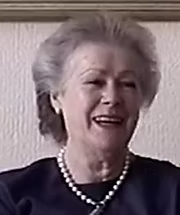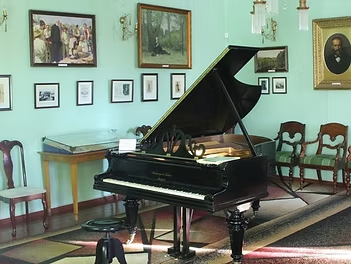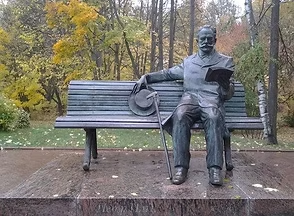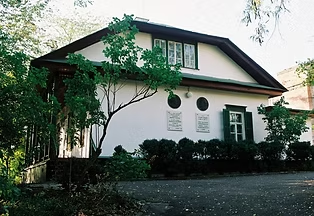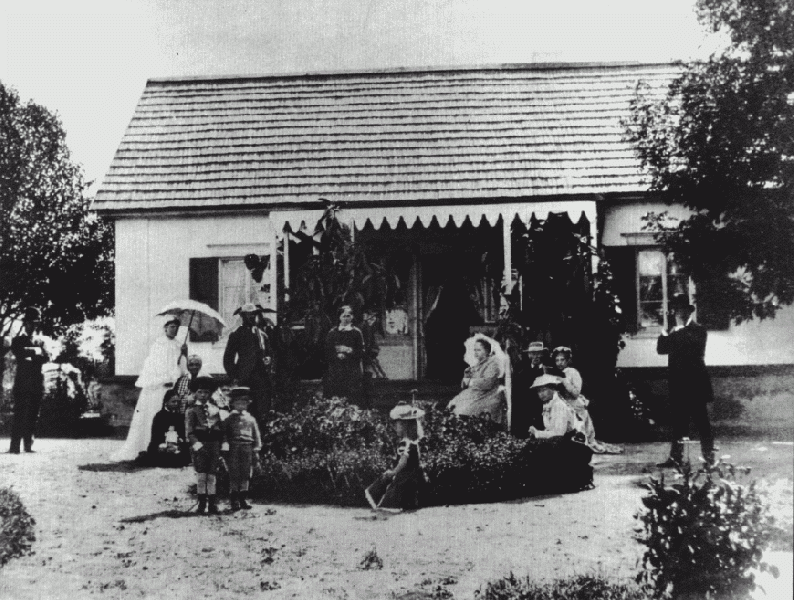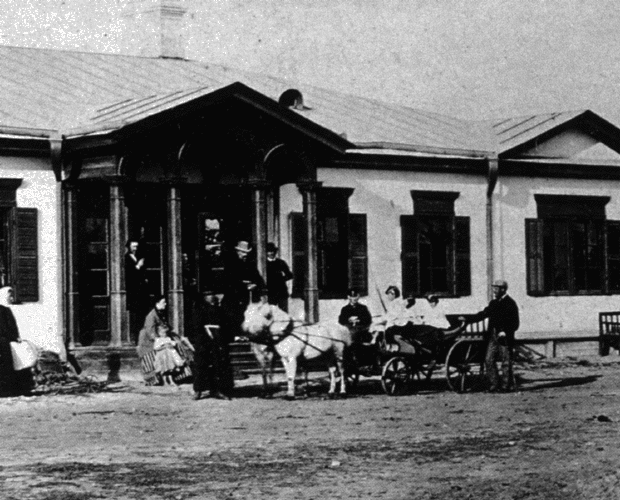ANITA CHELMINSKY
- Home
- ANITA KUSHNIR
June 19, 2006 | Mexico City, Mexico
INTERVIEW WITH ANITA KUSHNIR CHELMINSKY
Interview Conducted by Alexander Chelminsky
Translation performed by Mr. Carlos Bazan, Christopher Newport University, Department of Language
ALEX: You grew up the first years in Mexico City and then…
ANITA: I was 5 years old when we got back to Tampico
ALEX: Aha what was the thing that motivated the going back to Tampico?
ANITA: That my dad was more accustomed to work in Tampico; he knew more the things, he had had much commercial disappointments here with people who he was working to, and it hadn’t work, so he thought that going back to Tampico probably the economic situation was going to get better; and we were four children and…
ALEX: How old were you? You were 5 years old, you say…
ANITA: I was going to turn 5 years old, I turned then in Tampico when we got back
ALEX: And the oldest sister how old would be?
ANITA: Rosita is 4 older than me…
ALEX: So 9
ANITA: Abraham is 6 older than me..
ALEX: So 11
ANIT: And 2, 8, so Ester would be…5 plus 7 12, 12.
ALEX: 12
ANITA: – Abraham was 10, Rosita was 8, oh no 7
ALEX: So it was a situation of having four kids that were already in the school
ANITA: We were already in the school
ALEX: : And transfer you to the school
ANITA: And Ester had already began, I guess the (irischechulle?german?) the first year
ALEX: And it was a matter of taking you out and leave to Tampico
ANITA: And leave to Tampico, thing that my mother didn’t want because the weather was awful; Tampico wasn’t well taken care of, and in many places there was much “chapopote” (Spa. Alquitran, Eng. Pitch, Tar)
ALEX: Yes
ANITA: even in the beaches and in the streets close to the beach there was much “chapopote” and she didn’t like it.
ALEX: Yes
ANITA: And the community was very small, there were more Jewish people, despite my mom came from Russia and my dad from Poland, that was such a drastic change for them because they didn’t speak the same language when they got married. They got married in Tampico
ALEX: They got married in Tampico and they understood each other in Yiddish.
ANITA: In Yiddish..
ALEX: But he spoke Polish and she spoke Russian
ANITA: And my mom in Russian… But my mom got here when she was 14 and a half years old.
ALEX: Well 14 years old, so she spent her childhood in Russia.
ANITA: Yes, a childhood where, I recently found out, I was in Russia 2 years ago and we went to search exactly where she lived, how she lived and everything else
ALEX: Where was it?
ANITA: Wonderful, I found some things
ALEX: In which place you say?
ANITA: My mom is from a place Kamenka, from Ukraine
ALEX: Ukraine, yes
ANITA: Ukraine that is very close to… I already forgot the name of the capital of…Kiev, not Kiev, yes Kiev
ALEX: Kiev, yes
ANITA: We traveled from Kiev to Cherkasy there we stayed in a hotel and then we traveled to meet my mom’s cousins, that 2 of them are still alive; and I didn’t think they were because all the time my mom sent them packages and all those things, I thought because they answered back a newspaper post, many years ago. When we got there, my mom was brought by an uncle Benito Krichevsky here in Mexico, who had arrived some years before to Mexico thinking about not staying, so he found a Mexican lady and got married with her, he said… my papers… He came from the Russian army… I get my papers and get divorce, but he found out that the father of the lady was a General and there the show finished. So, he brought us to Tampico and there they stayed, there, when my dad arrived from the ship he came with two friends, they came from Danzig. I don’t know if Abraham told you
ALEX: The (Danzig) harbour, yes
ANITA: To stay in United States, but they didn’t stay because there wasn’t a job for Polish.
Part II of the tape START HERE:
ANITA; So, when they got to Tampico, they could stay there, and my dad also had money. But, imagine a man trying to change money, or exchange money at the black market. So, they through him in jail……WAIT! NOT IN TAMPICO, IN DANZIG! And, my father left Poland because my grandfather (his father) took him up to Danzig because the army wanted him. Abraham didn’t talk to you about this yesterday?
ALEX: No, he didn’t mention it.
ANITA: My Dad was going to be a rabbi. He all ready to graduate, then the army selected him. My grandfather thought he was going to be prepared, so he took him to Danzig, would keep him there for a little bit, then he would send him to the United States where he had some family members. I don’t remember where the family members were. Do you remember? Did Abraham tell you?
ALEX: The relatives of your grandpa? No, he didn’t mention it.
ANITA: And, I’ll tell you, it wasn’t done right away. Because, grandpa thought he that would bring him back to Poland. He didn’t really think that he would send him off to the United States. He thought he would take him, and he could work as a rabbit with him. But, what happened was over time, he met two friends. One was Mr. Grossman, and I don’t remember the other one.
ALEX: Was it Majer/ Meyer?
ANITA: No, it wasn’t them. But, he got to know both men, and they changed money at the black market.
ALEX: So, they dedicated themselves to exchanging money at the black market?
ANITA: Yes, that’s’ what they worked in. My Dad got here with a thousand dollars, and sometimes he’ll say he got here with ten thousand dollars. He, himself, wouldn’t remember. Whatever he brought. Well he had money, because, everybody else who came didn’t have anything. So, when they got to Tampico there were three or four guys at the port who were waiting to receive whoever came, and try to help them, because it cost one hundred dollars to get off the boat and go to the port. So, my dad had his money, and he lent some money to Grossman, so he could get off the boat, as well. And, then they stayed in Tampico. When my uncle saw him he clapped, and said, “this one is for my niece”, because he didn’t think he was going to make it there.
Then my mother and my father married. That was very difficult. They came with no language; they couldn’t speak the language. That was typical for everybody who came. Everybody came with very few things to relate ? here.
ALEX: After your father got to Tampico, how long was it until he met your mother?
ANITA: I think three or four days. Because, my Uncle Benito invited him to the house. I think three or four months passed, then they got married.
ALEX: Do you remember how old they were?
ANITA: I’m going to feel very guilty because I never had the interest in asking them how old they were. And, they didn’t talk about it. They even invented or came up with the day your dad was born because we didn’t….. Well you know before the system and after the system, we didn’t know them. I think we came up with of July 14th. And that was his birthday; that is what was shown on his passport. And, the other day I found his driver’s license, but that was here from Mexico, and it also said he was from 1940 or 1941, and I saved it. But, what can I tell you? I save a lot of things, and a lot of memories. And, I don’t know how long, but I know they married….
ALEX: Do you know how old they were?
ANITA: My mother 15. My father 21. He was going to turn 21. I didn’t know, exactly. Then I verified. with the “Alturo House” in Tampico that they made them a cup of coffee and some breakfast, and they got married there. And, they stayed to live in Tampico. My grandmother came with my mother and they lived in the same house with my father; all three of them together.
ALEX: Your grandmother and your mother lived together in the same house with your father??
ANITA: Yes, with my father!
ALEX: So, his mother-in-law was living in the house?
ANITA: Yes, and she was coming as a widow.
ALEX: Do I recall her losing a child, or a son?
ANITA: Two. She lost two sons. Mother remembers that one died from tuberculosis, and the other from another cause, like measles, I think it was; also called “ rubiolla’. That is what my mother remembers; two kids; two little brothers. So, my mother came as an only child. And, my father was alone here.
ALEX: What did your father do?
ANITA: He sold farm stuff; a lot of petroleum stuff. (??fertilizer). There he learned Spanish. Then afterward my grandmother got to know a few travelers in Tampico who came from Fort Worth or Dallas. They were coming back from a trip they had previously made. So, they went to Dallas, then they came back to Tampico. One of the men says he met a widowed woman with only one child in Tampico, and that she was a fine lady. They didn’t tell my grandmother that the man she was going to meet had 5 kids already. He had one married son, and four single sons; and they were grown up. So, they got to talking, and eventually they got married. Then my grandmother went to Fort Worth. When she got there, there and was a surprise! She met four beasts. Two women who made her life miserable. And, in a little bit time she got pregnant. That’s when Rosita was going to be born.
There wasn’t any technology at the time. There was not phone or anything. So, my mother sent her a card that she was awaiting a son in February, and asked if she could come and accompany her again. Then my grandmother responded that she, too, was pregnant, and that she is awaiting a son in April! And, it would be better if she came to Fort Worth. So, my mother went with Sterie (estera?) and Abraham, and in a little bit of time, my father as well. And, my grandpa wanted my dad to stay there, but my dad didn’t really like it because he had to learn English, and that took too much work for him. So, they all returned, but they didn’t go back to Tampico, they went to Mexico City. That is when was I was born. Mother waited for my uncle was born. His name was Ross David, but they called him “Artie”. I think they stayed seven months over there. And, my mother got there with two sons, Abraham was five (?fire?) and he/was crazy. They went to Tampico, and he also returned to work as a farmer/ seller; a merchant. Then they gathered some money. He grouped up with somebody, and that man stole everything from him. So, they all decided to go to Tampico, because they thought it was better for my dad. So, they went there and we came back when Lorita was, I don’t remember if it was three years, or four years old?
ALEX: So, you have memories of Tampico?
ANITA: Very little. I remember we lived on the third floor of a building. I remember one time we were going up the stairs, and my mother she fell down the stairs. It was terrible. I also remember once I was on the roof and I fell and I broke my arm. What did my dear brothers do? They locked me in a closet. Then my mother found me when she came home from work. It was around 8 pm, and she looked around, and she said, “Oh , I’’m missing one!”. Then my brothers showed her I was in there! They took me to the hospital, and I got a cast. What memories, no?
ALEX: You just don’t forget things like that, do you?
ANITA: No, you just don’t!
ALEX: So, you spent the days without your parents?
ANITA: Well, my Mom was there in the morning, but then she would go to work during the day. The boys went to school, because they weren’t born in Tampico, Tampico. They were born in Villa Secillia, which was later city Medero. Then when I was born, maybe five years, maybe less, around the time I broke my arm, we spent that much time in Tampico.
ALEX; I didn’t know your dad was going to be a rabbi. Do you remember any religious aspect? For example, did he wear a kippah?
ANITA: Well, my Dad always went to shul/synagogue.
ALEX: Was it here in Tampico?
ANITA: No, it was not in Tampico.
ALEX: Did you have any conscience that you were Mexican, but you were a little bit different?
ANITA: Yes. Yes, I do remember people made you feel like you were NOT one of them. Then I remember afterward, we lived a house where the owner of the house was a photographer. There was patio and a fountain in the middle. They rented us half of the house. We showered in a big tub made of aluminum. My mother would heat the water.
ALEX; So, did your family have running water?
ANITA: Yes, there was running water, but there wasn’t running hot water. There was an electric heater, but I don’t remember if there was an actual heater, or who’s it was. The other renters didn’t have any children, and they became very good friends with my parents. I remember one day there was an incident at the school and they came to school and they defended me. It was about my last name, or something. But, if you’re asking about if I remember Jewish things: we didn’t eat pork we ate fish and chicken. First, it was cheaper, and second, it was healthier. We didn’t eat pork, then there was some access to crab and shrimp, but we didn’t eat that at home
ALEX: What language did you speak at home?
ANITA: Yiddish.
ALEX: That was with you guys (siblings) or your parents?
ANITA: That was with my parents; between them they spoke in Yiddish.
ALEX: And, to you, what language did they speak?
ANITA: To us, the kids, they spoke in Spanish.
ALEX; So, after time they both learned Spanish, right?
ANITA: Yes, they did. My mother went to school and she learned to read and write in Spanish. She wrote in Spanish without any flaw. She went to night school, and she learned Spanish perfectly. My father spoke, well if you heard him, you’d assume he worked somewhere fancy to learn. He spoke a very great Spanish.
ALEX: So, was it more difficult for your father to learn Spanish?
ANITA: Not Spanish. It was more difficult for him to learn English, so he didn’t want to learn it. But, my mother spoke English, and she spoke a precious English. My mother was skilled in learning languages.
ALEX: So, how long were you in Tampico. How many years?
ANITA: Well, Lolita was about 5 years old, and I was 9. Because, I got here and they put me in Benito Juarez, the school, into the 4th grade.
ALEX: What about Abraham? Was he already finishing elementary school?
ANITA: Yes, Abraham already finished elementary school. Or wait, I’m not sure if he did his Bar Mitzvah in Tampico?
ALEX: He commented that he was 12 years old when he came to Mexico City, and he had to finish his elementary school again, because there was a difference in school years. Tampico finished in July, and school in Mexico City finished in December, so he had to wait six months. So, then he went to Yiddish school for six months so he could finish 6th grade and he could catch up. So, he did do his Bar Mitzvah here in Mexcio City.
So, you said you went to school at Benito Jaurez. Does that mean not everybody went to a Jewish school?
ANITA: They came and, Sarah and Abraham went to a middle school, it was Jewish school. And, Rosita and I went to Benito Juarez. Rosita was going into 6th grade, and I was going into 3rd grade. Then my parents moved into a new house, and then there was where I finished elementary school. I finished at Manuel Lopez Costea. It was in a whole different community. And, then after elementary school, Rosita and I went to Yiddish. So, after elementary everybody went to Yiddish school. And, I was older than Lolita by 5 years, and she was already going to Gaberny ??
11:51 22dec START HERE:
ALEX: So, when you went to middle school, that was when you were in a completely Jewish community/population?
ANITA: Yes, but also my mother didn’t really like that we were out on the streets, and hanging out with people who really were different. [In Tampico?] She wanted us hanging out with people who were really like us. So, we had a lot of Jewish friendships, and friendships that related to us. [Mexico City?] And, I remember one time my mother invited to me to some cultural Jewish party. We left by bus, and came back by bus. The building was amazing! It was pretty, and it really interested me. I was mesmerized looking at it all. I didn’t understand anything. I didn’t understand anything about it, but I still liked it. My mother loved it. She loved the religion. She loved anything that had to do with Judaism. My mother liked and received the “Forward”??? magazine from New York. She had two magazines from New York and she really liked them. She liked the Jewish presence.11-12:
But, Rosita did not grow up with a Jewish presence/ in a Jewish community. There were very few Jewish families there when they lived in Komenka And, I was a little bit surprised when I went there. We went to a little Tchaikovsky museum. Tchaikovsky was friends with a man from Komenka and stayed with him for about 2 months, and he had a piano in the room and a big sculpture. They had a lot of things there, but they would not let you into the room where she lived. But there were notes, sheet music, and musical scores, and lists that belonged to him. [12:30-12:40]
We went through a lot of towns and and a lot cities, and none of them had anything. We passed through a lot of grassland and a lot of nice scenery, but cities really didn’t have much. We only went through them because the guide was telling us to. The guide would have to pick towns apart to find things to tell us about. But, when we got to Komenka, it was divided into a V. It was a tpwn of eight thousand inhabitants, and the guide didn’t know that either. We got there and we found out it was actually a town! We saw the monument with the list of lost family members, and lost families. We asked the people if they knew anybody with the last name “Koshabosky”, because that was my mother’s last name. That was on her mother’s side. On her father’s side it was Grechewski. We looked that name up, and then they showed family members who were killed by the Germans on the monument, but nobody knew where their house was.
I don’t think anything changed all that much in the town. I mean there was store here and there; one store that sold thread and needles, etc., but they couldn’t find the house. It was a small town for eight thousand people. The guide would ask in Russian if anybody knew where that family lived, and nobody knew. Finally, one lady said in Russian, “La Buba Olga.” She was about 80 years old. We went to her house, she was already tired. It was about 11:00 a.m. I didn’t know what language to speak to her in. The guide said to speak Yiddish to her. The moment I spoke Yiddish to her, she cried! You could see tears roll down her face. And, she said, “ tu retz Yiddish?”, [14:17] which means “do you speak Yiddish?” And, she grabbed me. She was really excited, and really emotional. I told her who I was. Clearly, she didn’t understand, who I was, or that I was coming from Mexico. She didn’t even know what Mexico was.
The guide then told her, “America, America”! Then the Buba seemed to know what was going on. Then the Buba kept saying, “Rykamicz, Rykamicz. Then she told us where the house was; the house of the family, so we went to go look for it. When we got there, we were surprised to find that a church had been built on property of the lot; a big church with three big crosses, like a Russian Orthodox. But, that was only on one half of the lot. The other half of the lot was still very dirty with run down little make-shift houses. Only one house was made of brick. The other houses were made of just wood. And, that’s where they lived. My grandparents lived in the brick house, and the other children lived in the smaller houses. We’d like to think that ???? is something supposed to be here? [15:09] The Buba ?? didn’t really remember much? That’s all we went to look for. And, that’s all we found there.
So, we turned around, and we were heading out, when somebody said there was a big market, or big home where somebody lived who had a lot of connections with artistic and political people. So, we went there, but when we arrived they wouldn’t let us in. It wasn’t very big. There was a sculpture of a seated Tchaikovsy, and it interested me; it grabbed my attention. I saw it, and it said, “museum”. Unfortunately, it was closed because it was a Tuesday. When we told them who we were, and that we were willing to make a donation, they let us in, and showed us around. [15:50]
It was incredible! One of my cousins has a daughter and a son. The daughter is married to one of the last and only Cossako [Cossak?] son in the town who was not Jewish. But, she plays piano. So, the guide says, “Then play!” “I give you permission!’ But, she didn’t even get near it. How was she going to play on Tchaikowsky’s piano”????!!!! And, I told her, “Play!” “Play!” “Sit down and play!” There was no human power that would make her sit down play that piano. She opened up the piano, and I moved my fingers across the keys. And, I said, “Look, I can touch the piano, and I don’t even play piano!”. And, she said, “Yes, but you don’t have the feeling!” Then she started to cry. So, then you think, in that dirty eight thousand person town you find a Tchaikovsky museum and his piano!
ALEX: Do you know how those people survived?”
ANITA: No. The only thing I remember is, and I don’t really have a great memory, I have a card that my uncle got along with a photograph of the parents who turned 104, I believe. After that else knew about them. We don’t know if they died of natural causes, or if they really lived to be past that year. They didn’t look they were going to live much longer. What else can I tell you. The people that we met didn’t really say, the things they didn’t know, they would just invent, or pretend. So, a lot of the information really can’t be trusted. But, it was a really emotional trip, [16:50]
I always wanted to go to Poland, because Rita went to Poland. Rita saw the house of the grandparents; the Chelminsky’s. Abraham went, too, and your parents (Alex’s), but not Martha didn’t. I have a photograph upstairs of the house. At first, they didn’t let Rita in, but the second time they went they allowed Rita in. She went inside to the front part of the house.
ALEX: Lets’ return to talk about Mexico. What years were you in Yiddish school? Thirties? Forties? [17:35]
ANITA: No, before the forties. I was born in 1932. 1940 was when the war was going on, but I don’t remember anything about the war. They just didn’t speak out the war at home, and I was too young to acknowledge it.
Sometimes you only heard about it on the radio, or in the newspaper, or on the street, but that was about it. The community was so small, you didn’t really hear about it. I do remember coming a second time with my mother, she rented a house on Ciappa Street. When my mother came off the boat, she had been traveling with three or four families who were also from the same area she was from; Russia, or Kiev. They were families who were also protecting her and her mother. Those people were the Bierbitzki’s, the Shuls, Roitman. There were about 7 or 8 families that came together. She had a little community of people from the area she was from in Russia. When they all returned, they began to spend time with each other.
ALEX: Was it difficult for your father economically? [18:40]
ANITA: Yes, it was very difficult. He wasn’t really a good merchant. He didn’t know… Your grandpa was good, but he didn’t really study much. He didn’t study to be a rabbi. Uncle Abraham also got here when he was really young. I have a photograph of him that I’ll show you later where he looked really young. Uncle Abraham lived with us, but, afterwards I really don’t’ remember much. They moved to Matiticlan, and they opened up a tool shop. They were there for many years. Then Uncle Jose and Aunt Stensial sold them that business, then they moved back to Mexico City and opened up a business on Pino Suarez Street. They opened that shop first, then they opened up a different one that your father spoke to you about. They got here and opened up the business on Pino Suarez, then they opened up the business on Col Re de Jora. I remember because one time I took my dad and my grandpa to Pino Suarez, and grandpa brought the Stempas. Aunt Stensial told us that grandpa wanted to come here to Mexico, but feared all the problems here ,so he sent Uncle Jose over to fix all his papers, and passport, and his visa in Kiev. No, not Kiev, it was Warsaw! Uncle Jose met some friends there who discussed his economic situation. Then later, a couple of years later, after Aunt Stensial died we talked about it, and we realized she had a LOT of memories, and we wished we would have recorded those stories. She had a lot of memories, and it would have been really great to share those. She’s the one who told us about all the stories in Danzig. Grandpa went to Danzig and put my father on the boat, and got him out of jail. When he got locked up somebody let grandpa know, and grandpa went to Danzig, took him out of jail, put him on a boat and sent him to America! [Mexico] [20:40]
And, getting back to those friends that uncle met in Warsaw. Those friends convinced him to not take out his papers, and to not fix visas and a permit to go to America, or Mexico, in this case. When that uncle returned to Klodawa, he told them that nothing was going to happen, he wasn’t planning on it (leaving Poland) and that the Germans were too far, they weren’t going to do anything. So, they stayed for a couple of more years and lived peacefully. They had their own house. They lived very well. They didn’t need much. They had everything there. Until, one day, the grandpa sent him again. He was obligated to go, because the grandmother said, “You have to go and fix papers for me.” “He and I are going.” Are you coming or not?” So, he felt obligated to go with them. So, they all went to Warsaw. They quickly, they all fixed their papers and visas, returned to Klodawa to started packing, and got on the VERY LAST BOAT that brought anybody of their kind (Jewish) before the Germans got there! [20:60-22:00]
So, the uncle didn’t want to go, the grandfather told him, “I’m going to Warsaw to fix our papers for myself and my wife, your grandmother.”” If you want to stay you can stay, but we are leaving.” So, that’s how they came. Uncle Jose had NO intention of coming.
So, they came back to Klodawa and they started packing, and they had their own house, and they were going leave it so somebody would sell it, but I’m not too sure what happened with that.
ALEX; I know a little bit about that. My Dad was investigating it. He found out that they left the house and some Polish people found out it belonged to Chelminsky or Rzeszewski. So, they found that somebody with that name was killed in the Holocaust, so the house went to the civil registrar, and registered it to be sold two years after the Chelminsky or Rzeszewski family member had been killed. My father investigated this. The family member died, in 1942, and the house was sold in 1944. So, the Poles figured nobody could return and seen they lost a house that was theirs. That’s how they [Poles] got the house. And, when you all got there years later, they didn’t let you in the house? They were afraid you were going to take the keys?
ANITA: They house was in a great location, and very well built.
ALEX: The house was right on the main road, right?
ANITA: Yes, it was right on the main road. That meant that the grandpa had a very prominent life because he was on the main road. When they got here they had nothing. They got an apartment on Argentina Street. That’s where the main part of the community was. Most of the businesses and people (Jewish) lived in the central part of the city, downtown. When they came and stayed in that apartment, that’s where I met all of them. That’s where I met that grandpa. That’s the first time I met a well-educated man like that. He would sit at the dining table and have a little bowl of soup, but with a chicken wing and salt. He would then dip the chicken wing into the soup, and then the salt, and he wouldn’t eat it, but would lick it, as he read the newspaper, and then he would put it back.
Those who were there were me, Martha, Abraham, Lolita, and the grandparents. And, he said something in Yiddish. I don’t know what it was. We were all sitting down, everybody well behaved. Then he would continue dipping his chicken wing.
Time may pass, but memory remains.
In silence, we hear their voices.
In remembrance, we find meaning.
